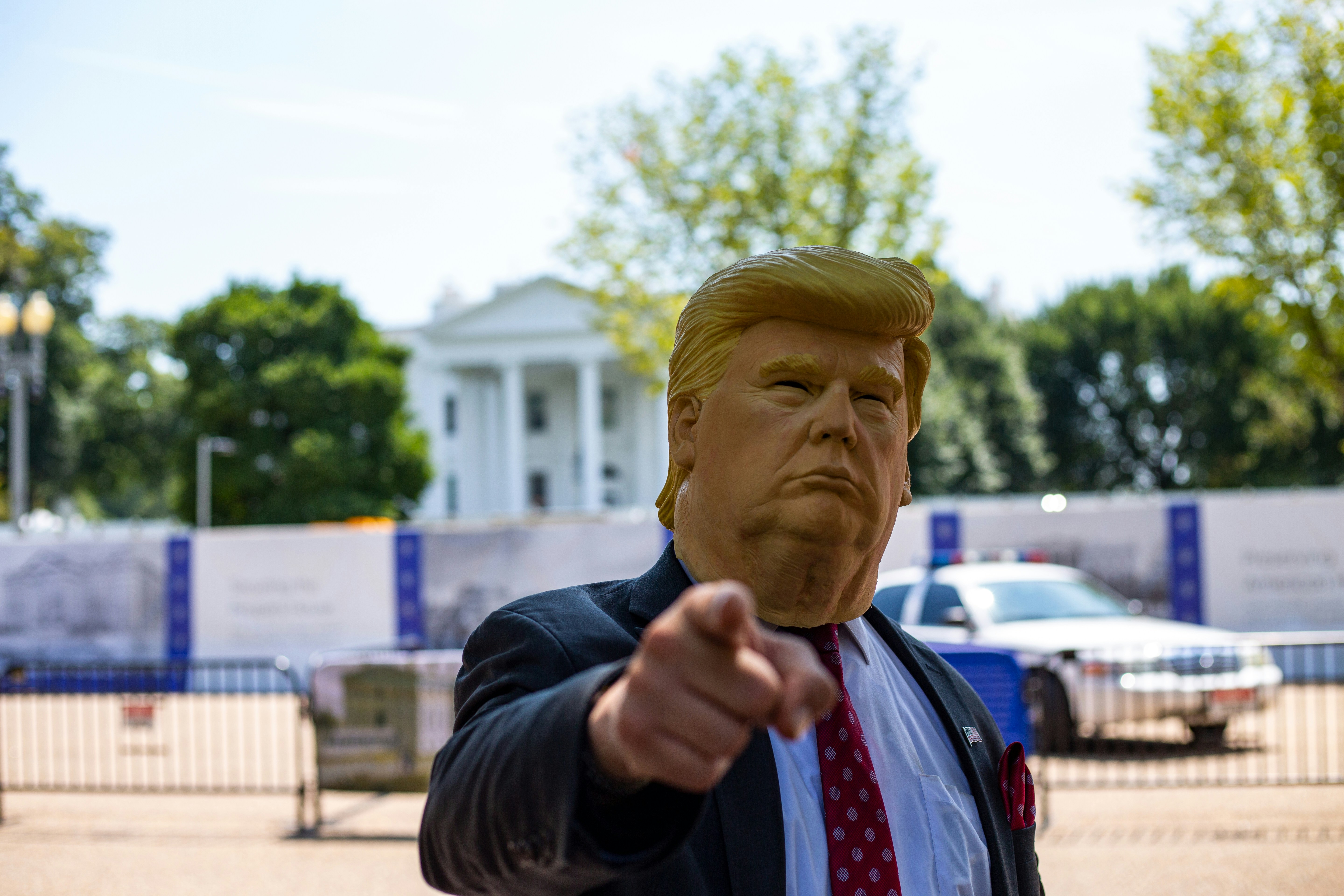The Controversial Notion of a Third Presidential Term: Understanding Trump’s Comments
Introduction to President Trump’s Controversial Remarks
In recent discussions surrounding American politics, President Donald Trump has sparked considerable debate with comments regarding the potential for a third presidential term. His remarks raise significant questions, especially in relation to the 22nd Amendment of the U.S. Constitution, which limits any individual to two terms. Trump’s assertions have attracted considerable attention, inciting strong reactions from supporters and opponents alike.
These statements have reopened conversations about the legality and implications of seeking a third term. Supporters view this as a chance to continue his agenda and confront political adversaries. Critics interpret these comments as a challenge to established norms and democratic principles. This divide showcases the polarized nature of contemporary American politics.
Legal experts have weighed in, analyzing the feasibility of Trump’s claims under existing laws. Many assert that the 22nd Amendment’s restrictions render any attempt to secure a third term unconstitutional. Others suggest that Trump’s history of challenging norms could lead to unpredictable outcomes, prompting concerns about governance and electoral integrity.
As public interest grows and media coverage escalates, the implications of Trump’s comments extend beyond rhetoric. An in-depth examination of reactions provides insight into their broader ramifications for American democracy and electoral laws.
Understanding the 22nd Amendment
The 22nd Amendment was ratified on February 27, 1951. It defines limits on presidential power by restricting any individual to two elected terms. This amendment emerged after Franklin D. Roosevelt’s unprecedented four-term presidency. His extended leadership raised concerns regarding the centralization of power.
The historical context of the 22nd Amendment is crucial. Roosevelt’s bid for a third term in 1940 sparked debates about the validity of prolonged presidencies. Critics argued that such tenures could undermine democratic principles. As a result, the amendment formalized the two-term limit to promote checks and balances within government.
The primary goal of the 22nd Amendment is to prevent any leader from gaining excessive power. By restricting the presidency to two terms, the amendment fosters political diversity and allows fresh perspectives in governance. This foundational understanding is vital when interpreting contemporary political discussions, including Trump’s remarks about seeking a third presidential term.
The proposal for a third presidential term challenges the very fabric of American democracy and reflects the urgent need to uphold the principles established to prevent the concentration of power.
The Significance of Trump’s Comments
President Trump’s suggestion that there exist “methods” to evade the 22nd Amendment has raised eyebrows and ignited considerable debate. The amendment aims to prevent any individual from holding significant power for an extended period. Trump’s assertion, insinuating possible circumvention of this constitutional barrier, raises concerns about the respect for democratic norms.
Speculating on these “methods” opens a Pandora’s box of constitutional questions. Potential avenues could involve legal re-interpretations of the amendment or attempts to amend the Constitution itself. Given the stringent requirements for constitutional amendments, successfully overturning established laws appears difficult. Nevertheless, Trump’s comments challenge conventional understandings of presidential tenure and reflect mounting tensions around electoral integrity.
Moreover, these remarks suggest a trend where political leaders examine the flexible limits of their authority. Modifying or reinterpreting the 22nd Amendment could set concerning precedents, destabilizing the constitutional respect that underpins American governance. Such developments invite scrutiny on the mechanisms of power. Trump’s comments extend beyond a singular statement; they embody larger issues of governance, balance of power, and the rule of law.
Potential Risks of a Third Term Pursuit
The idea of President Trump pursuing a third term presents various potential risks that require examination. The erosion of constitutional boundaries is foremost among these concerns. The U.S. Constitution explicitly states that no individual may serve more than two terms as president. This principle was established to prevent power consolidation. Trump’s pursuit of a third term could undermine this tenet of American democracy, setting dangerous precedents for future leaders.
In addition to constitutional concerns, the suggestion of a third presidential term may exacerbate existing political polarization. The national landscape has become increasingly divided, marked by stark ideological differences. Trump’s ongoing presence in public discourse could deepen these divisions, galvanizing support among his base while alienating opposing factions. Such polarization risks escalating hostility, diminishing prospects for bipartisan cooperation.
Trump’s ambitions could also invigorate his supporters, potentially leading to heightened activism. This mobilization might challenge democratic norms and disrupt traditional campaign tactics. The prospect of a third term may embolden some followers to adopt aggressive strategies, threatening fair elections and institutional authority. The implications of such activism are profound, reshaping the political fabric of the nation.
Reactions from Political Commentators and Experts
Trump’s recent suggestions about a potential third term have elicited diverse reactions from political commentators and legal experts. Responses reveal concerns about the implications these statements could have on the U.S. democratic framework. One notable voice is John Dean, a former White House counsel who warned that Trump’s comments could signify a “dangerous normalization” of actions that challenge democratic norms. He cautioned that seeking a third term undermines the constitutional provision designed to prevent power concentration.
Conversely, legal scholar Mark Levin defended Trump, framing the remarks as a political strategy rather than a genuine call for constitutional change. Levin argues that Trump’s comments are often misinterpreted and primarily aim to energize his base. Nevertheless, he acknowledges the necessity of examining the implications potential shifts in presidential term limits could have on U.S. democracy.
Other commentators emphasize the risks to electoral integrity. Some warn that discussions of a third term may set precedents that embolden future leaders to disregard constitutional limits. Influential media figures argue that U.S. citizens must remain vigilant, lest complacency erode democracy over time. This commentary underscores the need to reaffirm commitment to existing constitutional frameworks amid rising political polarization. As the discourse surrounding Trump’s statements continues, it serves as an essential barometer of American civic values.
In the delicate balance between political ambition and democratic ideals, the pursuit of a third term raises profound questions about legality, accountability and the future of governance.
Historical Context of Presidents Seeking More Power
The notion of a president seeking to extend their influence beyond customary limits is not new in American politics. Franklin D. Roosevelt (FDR) remains a significant figure in this discussion, having served four terms during unprecedented national challenges, including the Great Depression and World War II. His transformative leadership spurred debates about executive power and the risks of one individual holding significant authority.
FDR’s pursuit of a third and fourth term was justified by supporters as necessary continuity during crises. However, this departure from the two-term tradition set a concerning precedent, leading to fears about power consolidation. His presidency laid the groundwork for the 22nd Amendment, which established the two-term limit to prevent future presidents from compromising democratic principles.
FDR’s presidency serves as a cautionary tale about the dangers of expansive executive power. The reactions to his four terms highlight the importance of checks and balances designed to safeguard against power abuses. Following FDR, subsequent presidents, including Harry Truman and Dwight Eisenhower, emphasized adherence to the two-term limit, reinforcing the belief that leadership transitions are vital for democratic health. FDR’s legacy helps frame current discussions about presidential tenure and the need to limit executive authority.
The Evolution of Political Norms in Contemporary Politics
In contemporary politics, the evolution of norms has prompted heated discussions, especially regarding figures such as Donald Trump. Traditionally, political norms encompass unwritten rules that guide leadership behavior. One significant norm is the voluntary stepping aside after two terms—a practice generally respected by American presidents since FDR’s tenure.
However, shifting attitudes present a case for reevaluating these norms. Trump’s assertion regarding a possible third term raises questions about the integrity of democratic practices and accountability. The endorsement of such views suggests potential erosion of the long-standing tradition of relinquishing power after two terms.
Moreover, these evolving norms extend to various levels of government. Instances of leaders choosing to remain in office beyond traditional limits have become more pronounced. This raises essential inquiries regarding the role of political institutions. Are these actions indicative of a shift toward more flexible leadership dynamics? Or do they reflect a troubling disregard for democratic governance principles?
The ability to adapt to contemporary realities while respecting historical precedents poses a complex challenge. Such discussions invite deeper scrutiny into the future of political norms and the values that should guide leaders in a democratic society.
The Future of American Democracy
The suggestion of a third presidential term, as proposed by Trump’s comments, raises critical questions about the future of American democracy. This notion challenges the long-standing precedent set by George Washington, who voluntarily stepped down after two terms. The discourse surrounding this potential alteration necessitates an understanding of its implications on American governance.
One major concern is the erosion of checks and balances that sustain democratic systems. Should this concept gain traction, it could lead to power concentration that undermines democratic representation. The U.S. relies on a system where power is distributed among branches of government. Any movement toward extending presidential power jeopardizes institutional integrity and erodes public trust.
Moreover, Trump’s remarks resonate in a polarized political environment. Supporters and critics may misinterpret these discussions or engage selectively. While some observers see a third term as a remedy for political injustices, others emphasize the risks of bypassing established norms that historically promoted stability.
In light of these factors, citizen engagement in discussions about American democracy’s future becomes vital. A healthy democracy relies on informed debate and active participation. Engaging with the implications of proposed changes allows voters to uphold democratic principles. Understanding challenges posed by comments like Trump’s serves as an essential step toward respecting the democratic ideals foundational to the nation.
As politicians explore the flexible boundaries of authority, it is imperative that citizens actively engage in the discourse to ensure that the hard-won principles of democracy are neither forgotten nor eroded.
Conclusion: Upholding Democratic Values
Exploring the implications of Trump’s comments about a potential third presidential term necessitates reflection on broader themes like democracy and rule of law. This discussion highlights the delicate balance between political ambition and the principles guiding the American electoral process.
A possible shift toward a third term raises significant questions regarding legality, equity, and the spirit of democracy. These factors are paramount for maintaining public trust in governmental institutions. Throughout this discourse, we examined supporting and opposing arguments about a third presidential term, noting how they affect public perception and civic engagement.
The prospect of altering conventions related to presidential tenure challenges long-standing norms. It underscores the responsibilities of citizens in safeguarding democratic principles. Active participation in civic discourse and an informed electorate are critical for holding representatives accountable.
The evolving political climate demands ongoing debate. These discussions help clarify how ambition intersects with democratic values. Engaging in these topics empowers voters to make informed choices, preserving the electoral process’s integrity. Ultimately, safeguarding democracy requires vigilance and proactive involvement from all citizens. This collective effort is essential for protecting the democratic norms established throughout history.
For further insights on this pressing topic, you can watch this informative video: Trump and the 22nd Amendment.
Share this content:










Post Comment